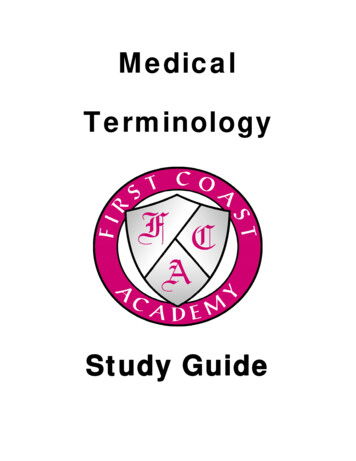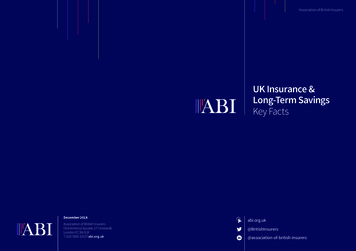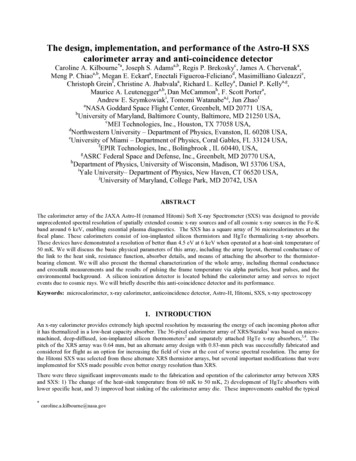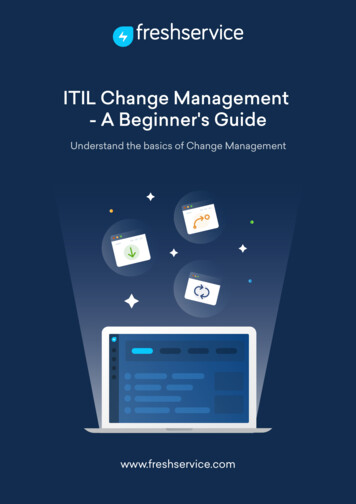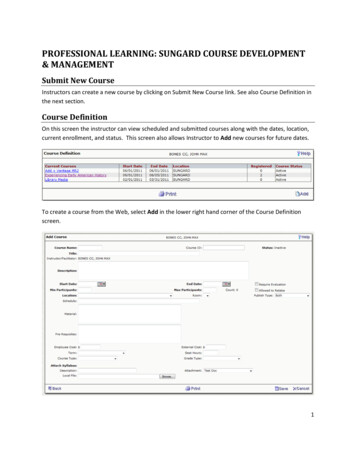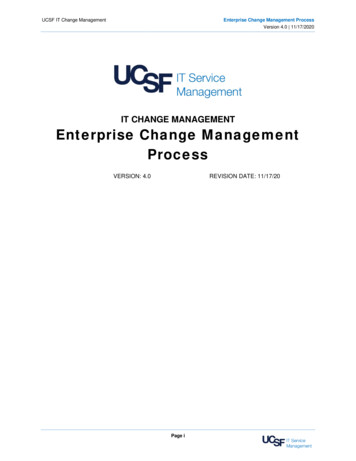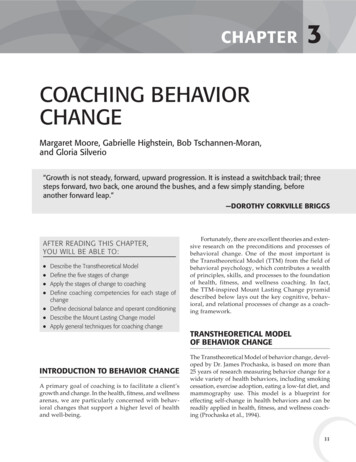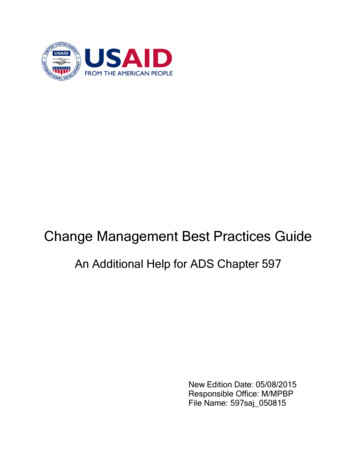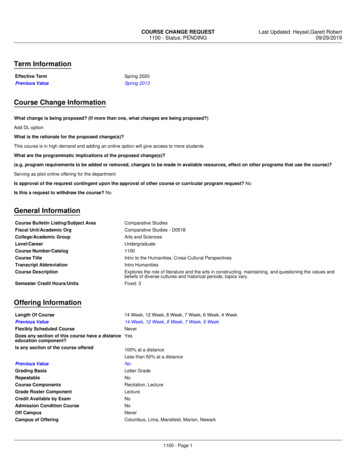
Transcription
COURSE CHANGE REQUEST1100 - Status: PENDINGLast Updated: Heysel,Garett Robert09/29/2019Term InformationEffective TermPrevious ValueSpring 2020Spring 2013Course Change InformationWhat change is being proposed? (If more than one, what changes are being proposed?)Add DL optionWhat is the rationale for the proposed change(s)?This course is in high demand and adding an online option will give access to more studentsWhat are the programmatic implications of the proposed change(s)?(e.g. program requirements to be added or removed, changes to be made in available resources, effect on other programs that use the course)?Serving as pilot online offering for the departmentIs approval of the requrest contingent upon the approval of other course or curricular program request? NoIs this a request to withdraw the course? NoGeneral InformationCourse Bulletin Listing/Subject AreaFiscal Unit/Academic OrgCollege/Academic GroupLevel/CareerCourse Number/CatalogCourse TitleTranscript AbbreviationCourse DescriptionSemester Credit Hours/UnitsComparative StudiesComparative Studies - D0518Arts and SciencesUndergraduate1100Intro to the Humanities: Cross-Cultural PerspectivesIntro HumanitiesExplores the role of literature and the arts in constructing, maintaining, and questioning the values andbeliefs of diverse cultures and historical periods; topics vary.Fixed: 3Offering InformationLength Of CoursePrevious ValueFlexibly Scheduled CourseDoes any section of this course have a distanceeducation component?Is any section of the course offeredPrevious ValueGrading BasisRepeatableCourse ComponentsGrade Roster ComponentCredit Available by ExamAdmission Condition CourseOff CampusCampus of Offering14 Week, 12 Week, 8 Week, 7 Week, 6 Week, 4 Week14 Week, 12 Week, 8 Week, 7 Week, 6 WeekNeverYes100% at a distanceLess than 50% at a distanceNoLetter GradeNoRecitation, LectureLectureNoNoNeverColumbus, Lima, Mansfield, Marion, Newark1100 - Page 1
COURSE CHANGE REQUEST1100 - Status: PENDINGLast Updated: Heysel,Garett Robert09/29/2019Prerequisites and tronically EnforcedNot open to students with credit for 1100H (100H) or 100.NoCross-ListingsCross-ListingsSubject/CIP CodeSubject/CIP CodeSubsidy LevelIntended Rank24.0103General Studies CourseFreshman, Sophomore, Junior, SeniorRequirement/Elective DesignationGeneral Education course:Literature; Global Studies (International Issues successors)Course DetailsCourse goals or learningobjectives/outcomes Students explore how systems of power are intertwined with individual identity and experiences. Students improve information literacy by critically reading multiple types of texts to evaluate sources, biases, andpurposes Students assess the impact of their perspectives/identity positions, intentional and unintentional, on the world. Students evaluate significant texts in order to develop capacities for aesthetic and historical response and judgment;interpretation and evaluation; and critical listening, reading, seeing, thinking, and writing. Students will understand the pluralistic nature of institutions, society, and culture in the United States and across theworld in order to become educated, productive, and principled citizens.Previous ValueContent Topic List Humanities Culture Literature Arts Society Diversity Global World Literature Comparative LiteratureSought ConcurrenceNo1100 - Page 2
COURSE CHANGE REQUEST1100 - Status: PENDINGAttachmentsLast Updated: Heysel,Garett Robert09/29/2019 CS1100 online distancelearningtemplaterevised (1).docx: syllabus(Syllabus. Owner: Vu,Elizabeth A) Comp Studies 1100 Toy.pdf: QM checklist(Other Supporting Documentation. Owner: Vu,Elizabeth A) CS 1100 F'17 Syllabus.docx: comparison syllabus(Other Supporting Documentation. Owner: Vu,Elizabeth A) compstd1100 assessment.pdf: additional assessment information(Other Supporting Documentation. Owner: Vu,Elizabeth A)Comments Assessment plan for online 1100 will remain the same as the other versions of 1100. Last assessment reportapproved in 2016. Supporting documents attached. In-person 1100 syllabus attached. (by Vu,Elizabeth A on 09/19/2019 10:06AM) Please upload (1) in-class syllabus (for comparative purposes) and (2) a GE assessment plan that can beimplemented in this online environment. See instructions in manual; also posted es (by Vankeerbergen,Bernadette Chantal on 09/18/2019 02:18 PM)Workflow lizabeth A07/23/2019 10:33 AMSubmitted for ApprovalApprovedShank,Barry07/23/2019 10:45 AMUnit ApprovalApprovedHeysel,Garett Robert08/25/2019 12:02 AMCollege ApprovalRevision RequestedVankeerbergen,Bernadet 09/18/2019 02:18 PMte ChantalASCCAO ApprovalSubmittedVu,Elizabeth A09/19/2019 10:06 AMSubmitted for ApprovalApprovedShank,Barry09/19/2019 10:39 AMUnit ApprovalApprovedHeysel,Garett Robert09/29/2019 10:14 PMCollege ApprovalPending ApprovalJenkins,Mary Ellen BiglerHanlin,Deborah Kay09/29/2019 10:14 PMOldroyd,Shelby QuinnVankeerbergen,Bernadette Chantal1100 - Page 3ASCCAO Approval
SYLLABUS: COMPARATIVE STUDIES 1100INTRODUCTION TO THE HUMANITIESSPRING 2020Course overviewInstructorInstructor: Caroline ToyPreferred contact method: by email at toy.36@osu.eduAlternative contact method: via Carmen messagesOffice hours: W 1-4pm via Carmen Connect (video, audio, or live text) or by virtual appointmentOffice Location: no physical office availableCourse descriptionIn this class, we will examine interactions between “Western” and “Non-Western” cultures,thinking about colonization and immigration as key sites of “crossing cultures”. To do so, wewill read postcolonial theories as well as novels, short stories, nonfiction, and films aboutcolonization, immigration, and cultural clashes, past and present. We will then discuss complexissues like identity, social power, and inequality both in the literature and beyond it. We askquestions about the relevance of these ideas to our thinking about ourselves and others withinour cultural-historical context. We achieve these goals through group discussion on Carmen,journaling, assessments, and projects, many of which are shared with the class for feedback.Though this is a distance learning class, it requires a high degree of participation andengagement. You will be reading as much as 150 pages of fiction a week, and/or shortertheoretical readings. You will then be expected to participate every week in informal discussionand structured activities through Carmen. Passivity will simply not work for you in thisenvironment; in fact, non-participation for a full week is grounds for failure (see coursepolicies). In exchange, you will develop insights with your peers and with me as you practiceyour analytical and communication skills to gain higher levels of awareness and aptitude.Course learning outcomesBy the end of this course, students should successfully be able to: Investigate how systems of power are intertwined with individual identities andexperiences. Demonstrate information literacy by critically reading multiple types of texts to evaluatesources, biases, and purposes.
2 Assess the impact of their perspectives and identity positions, intentional andunintentional, on the world.GE Course InformationLiterary StudiesGoals: Students evaluate significant texts in order to develop capacities for aesthetic andhistorical response and judgment; interpretation and evaluation; and critical listening, reading,seeing, thinking, and writing.Expected Learning Outcomes:1. Students analyze, interpret, and critique significant literary works.2. Through reading, discussing, and writing about literature, students appraise andevaluate the personal and social values of their own and other cultures.We meet the outcome by: Reading and watching significant novels, nonfiction, films, graphic novels, andtheoretical works from around the world that focus on inter-cultural contactPracticing literary analysis through informal discussions and formal writing assignmentsExamining the historical and cultural context of these worksApplying these skills to works not on the syllabusDiversity: Global StudiesGoals: Students understand the pluralistic nature of institutions, society, and culture in theUnited States and across the world in order to become educated, productive, and principledcitizens.Expected Learning Outcomes:1. Students understand some of the political, economic, cultural, physical, social, andphilosophical aspects of one or more of the world's nations, peoples and culturesoutside the U.S.2. Students recognize the role of national and international diversity in shaping their ownattitudes and values as global citizens.We meet the outcome by: Exploring the development and importance of personal identity within literary works,including experiences of assimilation, status as “Other,” diaspora, and intersectionalityIdentifying systems of power and inequality within literary works, including colonialism,economic inequality, totalitarianism, and warApplying the knowledge of identity and systems of power gained through studyingliterature to examining our own identities and place in power structures
3Course materialsRequired major textsThese texts are available in print or (in most cases) electronically from retailers and libraries(OSU Libraries, OhioLINK library network, Columbus Public Library). Note that the films ofPersepolis and The Reluctant Fundamentalist are very different from the books and will notsubstitute. John Lewis’s March: Book One (print, ebook)Chinua Achebe’s Things Fall Apart (print, ebook, audio CD)Marjane Satrapi’s Persepolis VOLUME ONE or Complete edition (print)Lisa Ko’s The Leavers (print, ebook, downloadable audio)Jhumpa Lahiri’s Interpreter of Maladies (print, ebook, downloadable audio)Moshin Hamid’s The Reluctant Fundamentalist (print, ebook, downloadable audio)Susan Sontag’s Regarding the Pain of Others (print, ebook, downloadable audio)Ryan Coogler’s Black Panther (DVD, Blu-Ray, digital download or rental)Jamaica Kincaid’s A Small Place (print, ebook, downloadable audio)Required supplemental materialsThese materials are available on Carmen or through OSU’s Secure Media Library Alexandre Kojeve’s Introduction to the reading of Hegel (excerpts) Simone de Beauvoir’s The Second Sex (excerpts) Aijaz Ahmad’s “Jameson’s Rhetoric of Otherness and the ‘National Allegory’” Martin Luther King Jr.’s “Letter from a Birmingham Jail” Gayatri Spivak’s “Can the Subaltern Speak?” Toni Morrison’s “Recitatif”Course technologyThe instructor does not provide technical support. For help with your password, university email, Carmen, or any other technology issues, questions, or requests, contact the OSU IT ServiceDesk. Standard support hours are available at https://ocio.osu.edu/help/hours, and support forurgent issues is available 24x7. Self-Service and Chat support: http://ocio.osu.edu/selfservice Phone: 614-688-HELP (4357) Email: 8help@osu.edu TDD: 614-688-8743The above support information applies to all Carmen components, including Discussions,Groups, Modules, Carmen Connect, Messages, etc. It also applies to other OSU resources like
4viewing materials in the Secure Media Library and the U.OSU blogging platform. For issues withusing the OSU Libraries catalog for research, accessing electronic databases, or circulation,contact the Libraries directly. Self-service and chat support: http://libanswers.osu.edu Phone: 614-292-6785 Email: http://libanswers.osu.edu/q.phpBaseline technical skills necessary for online courses Basic computer and web-browsing skills Navigating CarmenTechnology skills necessary for this specific course CarmenConnect text, audio, and video chat Collaborating using Carmen’s Groups tools Using u.OSU (University’s Wordpress-powered blog platform) Recording, editing, and uploading audio (a written alternative option will be providedfor anyone needing an accessibility accommodation) – information will be providedNecessary equipment Computer: current Mac (OS X) or PC (Windows 7 ) with high-speed internet connectiono A tablet (e.g., University-issued iPad) is an acceptable alternative as long as youhave a keyboard and the capacity to save documents as Word files or PDFs Microphone: built-in laptop or tablet mic or external microphone Webcam is a plusNecessary software Word processor capable of saving in .doc, .docx, or .pdf formats (recommended:Microsoft Office 365 ProPlus): All Ohio State students are now eligible for free MicrosoftOffice 365 ProPlus through Microsoft’s Student Advantage program. Each student caninstall Office on five PCs or Macs, five tablets, and five phones.o Students are able to access Word, Excel, PowerPoint, Outlook and otherprograms, depending on platform. Users will also receive 1 TB of OneDrive forBusiness storage.o Office 365 is installed within your BuckeyeMail account. Full instructions fordownloading and installation can be found https://ocio.osu.edu/kb04733.o You are not required to use Microsoft Office. However, any assignmentssubmitted through Carmen dropbox will only be accepted in .doc, .docx, and .pdfformats. No submissions via Google Docs, Box, Word Online, or OneDrive.
5 Audacity: Audacity is a free audio-editing program available for Mac, Windows, andLinux platforms. It is not available for tablets.o Audacity is pre-installed in all Digital Union computer labs and can be used therewhen computer labs are open.o Audacity is the recommended software for audio editing for the advice columnpodcast project; however, if you have and are familiar with other audio editingsoftware that can export in mp3 format, you are welcome to use that. Web browser: it is strongly recommended that you use Google Chrome for this course,especially for CarmenConnect meetings and video streaming. Safari is not fullycompatible with CarmenConnect and some OSU video services. You are responsible forensuring that your chosen browser works properly with all course technologies.Grading and faculty responseGradesAssignment or categoryPointsDiscussion Questions (once per term, date assigned individually)85Wiki Contribution (once per term, date assigned individually)85Weekly discussion posts and participation15 per week/195 totalSyllabus Quiz5Short autoethnography50Diary of Systemic Injustices10 each/60 total Showcase entry Thesis exchange30Short essay take-home midterm150“Yo, Is This ” advice column podcast150Final Project: text review for class blog40Final Project: analysis paper120Total1000See course schedule below for due dates30
6Assignment informationFor every assignment except the syllabus quiz, detailed instructions and prompts will bedistributed in advance. The following is only a summary and does not include allrequirements.All formal writing assignments should be double-spaced, in 12-point professional font, withone-inch margins. For assignments where a word count rather than a page count is given,copy-paste your text into a Word document and use the word count tool.Discussion Questions: Once per semester, you will provide the week’s discussion questions foryour small group. You will submit three substantive (not yes or no) discussion questions on thecoming week’s reading by the Sunday prior to the start of the week (see later in this syllabus forclarification of this course’s Tuesday – Sunday schedule). You will submit your questions bycreating a new discussion in your small group area. Value: 85 pointsWiki Contribution: Once per semester, you will contribute to the class wiki by providing somespecific, in-depth context relevant to the work. Two or three students per week will providewiki articles. For example, during the week on Interpreter of Maladies (a collection of storiesabout migration in and out of India), a student might write an entry on the history of Partition,an event that sparked displacement in India and Pakistan. During the week on Things Fall Apart,a student might write a summary of British colonialism in what is now Nigeria. You will consultwith the instructor on your topic in advance to get ideas and ensure that contributors don’toverlap. Your wiki entry should be at least 300 words with proper citations and links to the restof the wiki. Value: 85 pointsWeekly discussion posts and participation: This includes posting at least twice per week inyour small group discussion forums as well as completion of the week’s module, including anysurveys, ungraded quizzes, large-group discussions, or other exercises (there will generally be atleast one but not all of these). Discussion posts in large or small forums should be at least threesentences and should contribute something substantive to the conversation. Value: 15 pointsper weekSyllabus quiz: A quiz on the syllabus integrated into the first week’s module. Value: 5 pointsShort Autoethnography: The autoethnography asks you to explore your position as a scholarthrough some kind of autobiographical event or aspect of your life (more instructions will beprovided). The paper should be 2-3 pages. Value: 50 points. Due January 19 via Carmendropbox.Diary of Systemic Injustices: For six weeks in the first half of the course, you will write weeklyjournal entries on examples of systemic injustice that you have witnessed personally or heardabout in the media in the previous week. Each entry should be approximately 1 page (that’s at
7least ¾ of a page and no more than 1 ½ pages), and will be submitted via Carmen dropbox.During week 9, you will post an expanded sample entry—whichever you think is mostinteresting—on the course U.OSU blog. These sample entries should be about 350 words.Value: 10 points per week (60 points total) plus 30 points for the showcase entry. Showcasedue March 8 via class blog.Thesis Exchange: The thesis exchange asks you to compose an argument and swap with agroup-mate for practice outlining and feedback. More instructions will be distributed. Thisexercise takes place in Week 6. Value: 30 pointsMidterm: The midterm will be take-home and open-book. It consists of three short essays (youwill be provided with five questions of which you choose three), approximately 1-1½ pageseach. It will be submitted by Carmen dropbox. Value: 150 points. Due February 23.“Yo, Is This ” Advice Column Podcast: The podcast assignment asks you to offer advice to acurious but less knowledgeable audience about an issue related to systemic injustice, structuralpower, or identity. More information will be distributed. This assignment involves audiorecording and editing and will be completed in groups or two or three. An alternative textbased way of completing the assignment will be available as an accessibility accommodation.You will also be required to produce a transcript. Podcasts should be 8-10 minutes long and willbe submitted through the blog in MP3 format. Value: 150 points. Due March 29.Final Project - Text Review: The final project has two components, an informal review of a text(book, film, TV series, album, or other piece of literature or pop culture) and a formal analysispaper about the same text. The informal review will be approximately 500 words and will besubmitted through the class blog. Value: 40 points. Due April 20.Final Project - Analysis Paper: The analysis paper takes a more formal look at the same text youfocused on in your review. You will perform a literary analysis centered around some theme inthe book, while examining how it addresses power structures, systemic inequality, identity, orsome more particular aspect of these we’ve talked about in class (e.g., colonialism). The papershould be formally written, properly cited in MLA format, and 3-5 pages. Value: 120 points.Due April 26.
8Late assignmentsNo late work will be accepted without consent from me (this consent will only be given in therarest emergencies; see attendance policy). Make sure you are keeping up with discussionevery week, because doing it retroactively will not count (discussions are closed for furthercomment at the end of the week). Do your other assignments well in advance, save your workfrequently and in multiple locations, know where the nearest computer lab is in case oftechnical problems, lock up your dog, do whatever you need to do to ensure that assignmentswill be handed in on time because, except in those personally-debilitating-car-accident type ofsituations, late work will not be accepted. I recommend you write your Carmen posts in aseparate document or copy them before you attempt to post so you have them if the postfails to go through. “Carmen ate my homework” is the new “the dog ate my homework”—andis not an excuse.Grading scaleIt is your responsibility to keep up with your average and expected grade for the course; I donot give out approximate averages. The best way to calculate an average is to divide the totalpoints you have earned by the total points available to date in the semester, and then multiplyby 100.93–100: A90–92.9: A87–89.9: B 83–86.9: B80–82.9: B77–79.9: C 73–76.9: C70 –72.9: C67 –69.9: D 60 –66.9: DBelow 60: EFaculty feedback and response timeI am providing the following list to give you an idea of my intended availability throughout thecourse. (Remember that you can call 614-688-HELP at any time if you have a technical problem.I do not provide technical support, but I do provide support with things missing from Carmen,so contact me ASAP if you cannot see required reading, a dropbox, or something similar.)Grading and feedbackFor weekly assignments, you can generally expect feedback within 7 days. This includes yourdiscussion questions and wiki contributions. Note that feedback on discussion boards will notnecessarily be individual; it may consist of a post or comment directed at your whole group, orat a specific thread. For large assignments such as papers or midterms, you can generally expectgrades within two weeks.
9E-mailI will reply to e-mails within 24 hours on school days. I make every effort to reply on the samebusiness day to emails sent before 5pm. Receiving an email from me after hours or on theweekend is not a guarantee that I will reply after hours in the future.Discussion boardI will check the discussion boards approximately every 24 hours on school days. However, ifyou have a question for me instead of the class or your group, or you need to alert me to anincident on the boards, please email me directly for the fastest response.Attendance, participation, and discussionsSchedule and Flow of the CourseExcept for the very last week of the semester, this course operates on a Tuesday to Sundaycycle so you have weekend days to complete regular work. Each week, the week’s module willgo live on Tuesday. All regular participation for the week, including completion of all themodule components and any special activities, is due on Sunday. You should participate in smallgroup discussion on at least two occasions during the week, once by Thursday and againbetween Thursday and Sunday. It is OK if you are only partway through the reading and modulewhen you make your first post, but you need to have done some of it to comment intelligently.Additional assignments have specific due dates that are listed in both the course schedule andassignments section of this document. The rotating assignments (such as developing discussionquestions for your small group and contributing to the course wiki) are individually scheduledvia sign-up at the beginning of the semester. For your assigned week, questions and wikicontributions are due the Sunday prior to the release of the week’s module. That is, if you arecreating discussion questions for week 6 (2/11-2/16), they are due to the instructor by theSunday at the end of week 5 (2/9), the same day all work for week 5 is due.Student participation requirementsBecause this is a distance-education course, your attendance is based on your online activityand participation. The following is a summary of everyone's expected participation: Logging in: AT LEAST ONCE PER WEEK TO PASS THE CLASSBe sure you are logging in to the course in Carmen each week, including weeks withholidays or weeks with minimal online course activity, except Spring Break. (During mostweeks you will probably log in many times.) If you have a situation that might cause youto miss an entire week of class, discuss it with me as soon as possible. Missing an entireweek of class without a really good reason (that is, something that would count as a
10multi-day excused absence for an in-person class, with documentation) is grounds forfailure of the course. See below for explanation of acceptable excuses. Office hours and live sessions: REQUIRED WITH FLEXIBLE SCHEDULELive sessions are mandatory; for each week in which a live session is held, twoscheduled options will be available. One of these will be video-based and the other willbe text-based for accessibility and those with slower internet connections. A survey willbe distributed in advance to ensure that sessions are scheduled so everyone can attend.For live presentations, I will provide a recording that you can watch later. Office hours: OPTIONALAll live office hours are optional and are available as video sessions, audio calls, or realtime text chats through CarmenConnect. If you are required to discuss an assignmentwith me, please contact me at the beginning of the week if you need a time outside myscheduled office hours. Participating in small group discussion forums: 2 TIMES PER WEEKAs participation, each week you can expect to post on at least two separate days as partof your small group’s substantive class discussion on the week's topics. That means youmust post at least once in the first half of the week and once in the second half of theweek in response to the questions generated by your group’s weekly discussant. Theseposts should be substantive, at least 3 sentences, and should not boil down to “I agree”or “I disagree” with no original contribution to the conversation. You are stronglyencouraged to post more often. Excused absences/non-participation:Excuses for missing an entire week of participation are similar to excused absenceexcuses in an in-person class. A death in your immediate family, a bad case of the flu, ora major mental health emergency would count because these understandably affectmore than 1-3 days of work. Issues that occupy only one or two days of your week, suchas a childcare problem, a job interview, an away game, a religious holiday, or foodpoisoning do not. Pre-planned family events (weddings, reunions, etc) and business tripsalso do not count as excused regardless of length; plan to make time to do yourclasswork. All excused non-participation must be documented in writing (doctor’s note,funeral program and obituary, or similar). There are no exceptions to this policy.Discussion and communication guidelinesThe following are my expectations for how we will communicate as a class. Above all, pleaseremember to be respectful and thoughtful. Writing style: While there is no need to participate in class discussions as if you werewriting a research paper, you should remember to write using good grammar, spelling,and punctuation. Do not begin your emails to the instructor with “Yo,” write in textspeak, or the like; be reasonably professional. Informality (such as an occasionalemoticon) is fine.
11 Citing your sources: When we have academic discussions, please cite your sources toback up what you say. (For the textbook or other course materials, list at least the titleand page numbers. For online sources, include a link.) Formal written assignments andthe wiki contribution have more stringent requirements; see assignment sheets. Backing up your work: Consider composing your academic posts in a word processor,where you can save your work, and then copying into the Carmen discussion. Conduct expectations: Rules regarding basic classroom interaction remain fairlyconstant across all classes at the university, and we will maintain that decorum in thisclass even though we are not meeting in person. This course requires a commitmentfrom all of us to maintain collegial, respectful spaces throughout: in large and smallgroup discussions, blog comments, live sessions, and other venues. Because we are in adiscussion-based environment and I believe in making the best possible use of your timein our classroom, guidelines governing your behavior in this class are strict. This alsoapplies to communication about class or class-created groups outside of officialplatforms (for example, harassment of one of your small group colleagues on Twitterwould still be a violation of our behavioral norms).As we all know, online communication can encourage nasty and dehumanizing behaviorto strangers because there’s a perceived lack of consequences. Rest assured that if youact like a troll—using slurs or other hate speech, denigrating your classmates’ identities,advocating violence, or any other flagrant disrespect—you will be graded accordingly.Incidents of bias and other disruptive virtual behavior will be reported to BART, OSU’sBias Assessment and Response Team, Student Conduct, and/or (for talk about violence)OSU Police, and will be subject to whatever consequences they choose to impose. Biasincludes any kind of discriminatory talk or action against an individual or group based onsex, gender identity, race, ethnicity, color, age, religion, sexual orientation, disability,national origin, veteran status, or HIV status. Sexual harassment (definitions initions.html) and also will not be tolerated.tl;dr: engage with this course with genuine curiosity, openness to new ideas, andrespect for difference. We’ll all get the most out of the experience that way.Other course policiesAcademic integrity policyPolicies for this online course General policy: Plagiarism is the unauthorized use of the words or ideas of anotherperson
Sep 29, 2019 · Things Fall Apart (print, ebook, audio CD) Marjane Satrapi’s Persepolis VOLUME ONE or Complete edition (print) Lisa Ko’s The Leavers (print, ebook, downloadable audio) Jhumpa Lahiri’s Interpreter of Maladies (print, ebook, downloadable audio) Moshin Hamid’s The Reluctant Fundament

